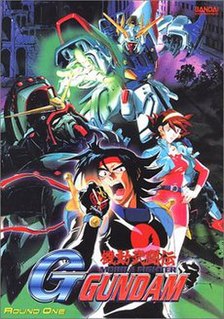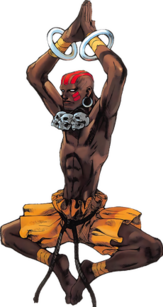| Look up dolls in Wiktionary, the free dictionary. |
A doll is a model of a human being, usually a toy.
Contents
Dolls or The Dolls may also refer to:
| Look up dolls in Wiktionary, the free dictionary. |
A doll is a model of a human being, usually a toy.
Dolls or The Dolls may also refer to:
| This disambiguation page lists articles associated with the title Dolls. If an internal link led you here, you may wish to change the link to point directly to the intended article. |
Phantom may refer to:
Fireball may refer to:

Mobile Fighter G Gundam, also known in Japan as Mobile Fighting Legend G Gundam, is a 1994 Japanese animated television series produced by Sunrise and the fifth installment in the long running Gundam franchise. The series is set in the "Future Century", where space colonies representing countries have agreed to hold an organized fighting tournament known as the "Gundam Fight" every four years to settle their political differences in place of war. Each colony sends a representative fighter piloting a giant, humanoid mecha called a Gundam to battle on Earth until only one is left, and the winning nation earns the right to govern over all the colonies until the next tournament. The events of G Gundam follow Domon Kasshu, the pilot of Neo Japan's Shining Gundam during the 13th Gundam Fight. Domon's mission is to both win the tournament and to track down his older brother, who is believed to have stolen the mysterious Devil Gundam from the Neo Japan government.

Initial D is a Japanese street racing manga series written and illustrated by Shuichi Shigeno. It was serialized in Weekly Young Magazine from 1995 to 2013, with the chapters collected into 48 tankōbon volumes by Kodansha. The story focuses on the world of illegal Japanese street racing, where all the action is concentrated in the mountain passes and rarely in cities or urban areas, and with the drifting racing style emphasized in particular. Professional race car driver and pioneer of drifting Keiichi Tsuchiya helped with editorial supervision. The story is centered on the prefecture of Gunma, more specifically on several mountains in the Kantō region and in their surrounding cities and towns. Although some of the names of the locations the characters race in have been fictionalized, all of the locations in the series are based on actual locations in Japan.
Iron Man, Ironman or Ironmen may refer to:

Dhalsim is a video game character in Capcom's Street Fighter series. He made his first appearance in Street Fighter II: The World Warrior in 1991. In the series, he is a mystical yogi who is loved by his villagers and family alike, he is also a pacifist who goes against his beliefs by entering the World Warrior tournament to raise money for his poor village.

Cammy White, also known as Cammy and the codename Killer Bee in Street Fighter Alpha 3, is a video game character in the Street Fighter fighting game series and the second female fighter to appear in the series. She debuted in 1993 as one of the four new characters in Super Street Fighter II: The New Challengers. She has also been featured in the Street Fighter Alpha games, first as a secret character and then as a playable character. The games explore her backstory as one of the evil M. Bison's deadliest assassins or "dolls" turned an amnesiac MI6 operative for the British government.
Madhouse Inc. is a Japanese animation studio founded in 1972 by ex–Mushi Pro animators, including Masao Maruyama, Osamu Dezaki, Rintaro and Yoshiaki Kawajiri.

Street Fighter II: The Animated Movie, known as Street Fighter II Movie in Japan and Australia, is a 1994 anime film adaptation of the Street Fighter II fighting game written by Kenichi Imai, directed by Gisaburō Sugii and animated by Group TAC. The film, originally released in Japan on August 6, 1994, was released theatrically in the United Kingdom, France, and Spain, and was adapted into English in dubbed and subtitled format by Animaze for Manga Entertainment. It was distributed by Toei Company, while 20th Century Fox also distributed in other countries.
A doll is a model of a human being, often a children's toy.

Street Fighter II: Ryu, simply titled Street Fighter II in its English editions, is a manga series written and drawn by Masaomi Kanzaki that was serialized in the monthly Family Computer Magazine in 1993 and 1994. It is based on the fighting game of the same name and its subsequent iterations. The manga was produced prior to the release of Super Street Fighter II and only features the original twelve "World Warriors".
Angelique may refer to:
Dead End or dead end may refer to:
Lucky Star, The Lucky Star or Lucky Starr may refer to:
Gisaburō Sugii is a Japanese anime director and Nihonga artist. He is best known for his work as director of the Touch series, the movie adaptation of the Arashi no Yoru ni children's book series, and the movie Night on the Galactic Railroad. He is a member of the Directors Guild of Japan and the Japanese Animation Creators Association.
To be happy is to experience happiness: a feeling of contentment or joy.

Ken Ishikawa was a Japanese manga artist. He is renowned as the co-creator of the Getter Robo anime series, as well as four of their subsequent manga continuations. According to Go Nagai, he considered Ken Ishikawa his greatest friend and ally.
Polygon Pictures, Inc. is a Japanese 3DCG animation studio.

Tekkonkinkreet is a three-volume seinen manga series by Taiyō Matsumoto, which was originally serialized from 1993 to 1994 in Shogakukan's Big Comic Spirits and first published in English as Tekkonkinkreet: Black & White. It was adapted into a 2006 feature-length Japanese anime film of the same name, directed by Michael Arias and animated by Studio 4°C. The film Tekkonkinkreet premiered in Japan on December 23, 2006.

Street Fighter, commonly abbreviated as SF or スト (Suto), is a fighting video game franchise developed and published by Capcom. The first game in the series was released in 1987, followed by five other main series games, various spin-offs and crossovers, and numerous appearances in various other media. Its best-selling 1991 release Street Fighter II is credited with establishing many of the conventions of the one-on-one fighting genre. Street Fighter is one of the highest-grossing video game franchises of all time and serves as one of the company's flagship series with total sales for the series being 44 million units worldwide as of December 31, 2019.